#trial... yellow... is this a justice soul reference?
Explore tagged Tumblr posts
Text
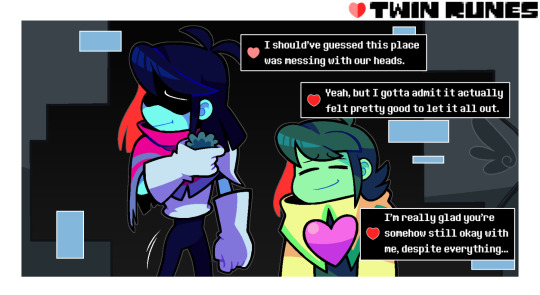
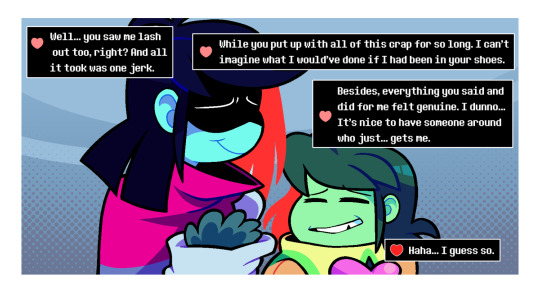
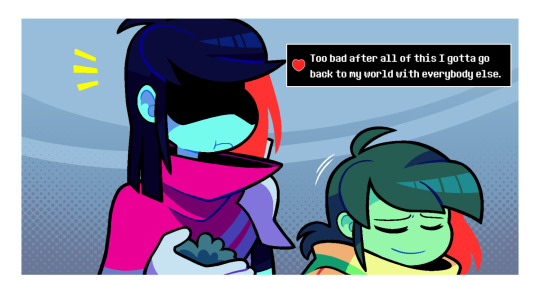
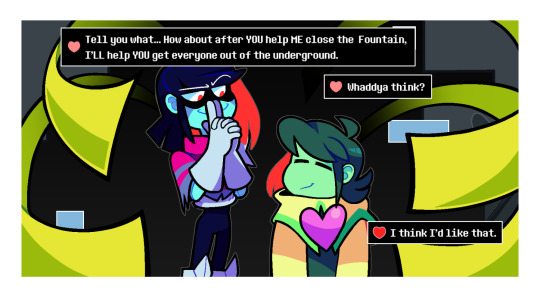
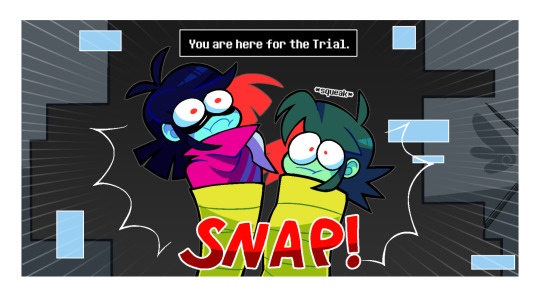
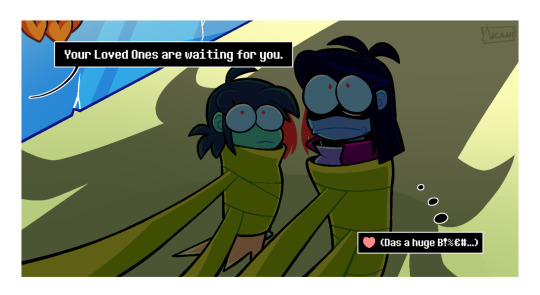
*Teleports behind you* Nothing personal, kids.
FIRST - PREVIOUS - NEXT
MASTERPOST (for the full series / FAQ / reference sheets)
EXTRA
#undertale#deltarune#utdr#crossover#undertale fanart#deltarune fanart#twin runes comic#twin runes#twin runes au#my art#comic#kris dreemurr#frisk#and as soon as they seemingly got rid of the red guy there's now a yellow person#a pretty beig one at that#I wonder if that's the priestess every darkner has at least mentioned once#wait...#trial... yellow... is this a justice soul reference?#yes#yes it is#but enough about that#kris doesn't want to say goodbye to frisk#my heart...#they've come such a long way#THEY'RE THE SIBLINGS EVER *sobs*
4K notes
·
View notes
Text
Brick Club 1.7.9 “A Place For Convictions”
I wish I was good at drawing because I’ve always wanted to draw this description of courtroom, as a sort of double-image of what Vajean is seeing in present with an overlaid, desaturated echo of what he remembers on top and slightly shifted. Anyway.
“...where all the machinery of a criminal trial was unfolding with its petty yet solemn gravity” I just really like this description. It sounds so, I don’t know, exasperated? Annoyed at the way unimportant things are treated as important and important things are brushed aside? I don’t know.
Was green the color of the legal authority back then? The judges’ chamber had a table covered with green fabric and now we get “tables covered with serge, more nearly yellow than green.”
“...for men felt there the presence of that great human thing called law, and that great divine thing called justice.” Hugo calls law human but justice is divine. I feel like this is such a good summary for what’s going on in this courtroom. The law is human, and can be completely wrong, like it is right here in this courtroom. People assume Champmathieu is Valjean, and there’s nothing he can do to change their minds. But Valjean, who is morally compelled to enter and to reveal himself, exists in the room as the entity of justice, perhaps divinely wrought since he is the only person in the room with the power to save Champmathieu and reveal the truth.
My FMA translation doesn’t do this, but the Hapgood translation italicizes “the” in our first view of Champmathieu: “This man was the man.” Which, just. That repetitiveness. “Jean, voila Jean.” Like, that’s the only other connection I can make.
“He thought he was seeing himself, older, undoubtedly, not exactly the same in features, but alike in attitude and appearance, with that bristling hair, those wild restless eyes, with that shirt--just as he had been on the day he entered Digne, full of hatred, and concealing in his soul that hideous hoard of frightful thoughts he had spent nineteen years harvesting on the prison floor.”
He said to himself, with a shudder, “Great God! Will I return to that?”
The Hapgood translation online has a typo that I wish wasn’t a typo (It says “concealing his soul in”). Valjean sees a reflection of his past self. What I find interesting is that Valjean notes that it’s not exactly their features that are similar, but their characteristics are. It’s not his looks that Javert and the other prisoners recognized, but his mannerisms. But Madeleine-Valjean has evolved and buried and changed many of those mannerisms in order to remain disguised, in order to both “conceal his name and sanctify his soul.” I don’t think he fears returning to that simply because it means returning to prison. He’s also done so much work trying to become a better person, the person Myriel bought his soul for him to become. He’s done so much work building himself into a respected leader, a knowledgeable dependable person. And to return to what he sees before him is to have eight years of hard work, hard internal change, whisked away in a flash. The notion of being broken down again and having to either accept that or try and build himself back up is terrifying.
Back in 1.7.3, Hugo tells us that what Valjean’s goal is is to “conceal his name and sanctify his soul,” “to escape men and return to god.” If he reveals his identity, he will be undoing nearly all of that. Obviously, his name will no longer be concealed. But if he returns to prison and, as he fears, returns to the state he had been in while at Toulon, he will be losing god and religion as well, falling back into the darkness. And he will be thrown back in to the thick of it, unable to “escape men,” watched all the time, surrounded all the time by other prisoners and guards, never able to be alone with himself except that at the same time he will only ever be alone with himself. The difference being he will be alone with himself without the slightest chance of reaching out to either god or community. But if he does reveal his identity, the one thing he will be doing is sanctifying his soul. He will be acting selflessly, sacrificing himself and his freedom for a stranger in a way that feels almost saintly.
“And by a tragic trick of fate that was stirring all his ideas and driving him almost insane, it was another self that faced him. This man on trial was being called Jean Valjean!” That night just outside Digne, Valjean faced a spectre of himself, his convict-self, the spectre which was then faced by the light of the Bishop. Here, he is again facing himself. This is another prospect of his convict-self, the fear that he will, as said above, return to that fear and hatred and darkness. And there is no bishop to face it down. Valjean must do it himself.
Except that this time, there is the smallest difference. Valjean has a moment of double-vision, seeing his own trial 27 years prior overlaid onto this one. He notices that “But above the head of the judge was a crucifix, something not in courtrooms at the time of his sentence. When he was tried, God had been absent.” God is present for this trial. Not in the bishop, like Valjean’s inner “trial” outside of Digne. He’s present in Valjean himself, who has the power to do the Right Thing, to save Champmathieu.
“Monsieur Bamatabois was one of the jurors.” This gets its own line, and then is never mentioned again. But I like that. Just like Bamatabois harassed Fantine and escaped unscathed, he’s here at this trial, with the potential to make the decision that ruins Champmathieu, and he will escape from this unscathed as well. We don’t need to be told that that’s what will happen; we just saw it on the street with Fantine, of course the same thing is going to happen in the court with Champmathieu.
Article 383 of the Penal Code of 1810 states “Thefts, committed on the highways, shall also be punishable with perpetual hard labour.” As far as I can tell he would have the same sentence for having a weapon/using violence? They don’t mention the weapon/violence here, which is interesting, because Javert mentioned it back in 1.6.2.
“He made gestures signifying denial, or else he gazed at the ceiling. He spoke with difficulty, answered with embarrassment, but from head to foot his whole person denied the charge.” The word “embarrassment” is weird to me here. That’s mostly what I have to say about this line. But also just, like, imagine people asking you questions in weird rhetorical styles and jargon you don’t really understand, about events that you were not present for, while they assume you’re someone you’re not, but you don’t have the the education or grasp of language to explain why they’re wrong, and you know they won’t believe you anyway.
“He seemed like an idiot in the presence of all these intellects ranged in battle around him, and like a stranger in the midst of this society by whom he had been seized.” God, no wonder Valjean’s fury at society led him to educate himself. He spent 15 or so years in prison boiling in that anger and probably thinking about this feeling, the feeling of being the ignorant and stupid one surrounded by people given power over him because they were educated. It only makes sense that he would see that the way to get on their level, to get revenge over them in some way would be to become educated.
The way Hugo describes all the people in the courtroom watching Champmathieu and wondering what’s going to happen etc reminds me of the way he describes onlookers waiting for the condemned to be executed by guillotine in The Last Day Of A Condemned Man. A grave decision about a man’s life has been turned into a spectacle. The courtroom is packed with judges, clerks, soldiers, gendarmes, and spectators who are “cruelly curious.” It’s the ultimate culmination of “to see is to devour.”
Hugo goes on a long tangent about the lofty style of language used by the defending lawyers, and how it’s really not suited to talking about the theft of apples. It’s interesting that he emphasizes this, because I imagine there are plenty of other crimes that really don’t sound very pretty to talk about in that lofty language. I feel like this is in line with his description of the court as “petty yet solemn.” Things like this lofty provincial language are taken so seriously despite how ridiculous and unrelated they should be to the actual result of the case. Except that I’m sure that they unfortunately affect the outcome--if someone follows the language rules better than the other lawyers, that’ll be the outcome. A digression, but when I was in community college I was on the speech & debate team, only we didn’t do the debate part of the competitions, because my professors hated that it wasn’t about who gave a better argument in terms of evidence and eloquence, but about who followed the rules to the letter. I feel like this weird provincial language tradition is a similar situation. In this case, the “violent and flowery” language of the prosecuting attorney, and the way he speaks so well obviously is going to affect the outcome of the case.
(Also, no wonder Champmathieu is staring about him like an idiot. This rhetorical style sounds obnoxious and confusing to listen to, especially when referring to something like stolen apples.)
The Bossuet reference about mentioning a hen at a funeral oration is something about him giving a funeral oration for Anne of Cleves, if I remember correctly. Unfortunately I can’t find the full text of that specific oration anywhere so I don’t know the context.
Autonomasia is a rhetorical style in which the use of generalizations or common nouns replaces specificity. For example, “he is from the city” instead of “he is from Paris.”
La Quotidienne was a French royalist newspaper. I can’t find anything on Oriflamme but I assume it’s a similar publication.
I do not know enough about the Romantics and their dissenters, but Hugo was definitely being catty when he described how the prosecutor “thundered against the immorality of the romantic school--then in its dawn, under the name of the Satanic school...And not implausibly, he attributed to the influence of this perverse literature the crime of Champmathieu, or rather of Jean Valjean.” Hugo himself was a Romantic author, and I do know that his play Hernani caused an actual riot in the theatre, but I don’t know enough about Royalist and Classicist criticisms of Romanticism to know exactly what Hugo is referencing here.
#les miserables#les miserables meta#brickclub#lm 1.7.9#les mis#les mis meta#posting this later in the day because my brain did NOT want to cooperate yesterday
6 notes
·
View notes
Text
BLOOD ISLAND - Mirror Match Meta
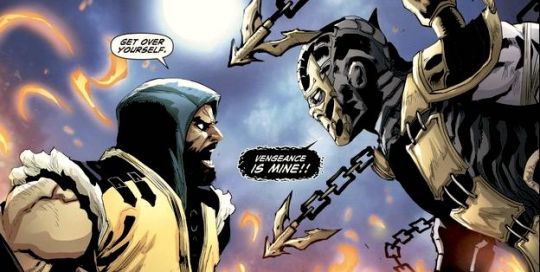
Scorpion: The fire is home now. Hanzo: No. The fire is my heart beating.
The fire is destructive, all-consuming, yet burning ever-bright and ever true. It’s pure energy unleashed in light and flames that are dyed every shade of yellow and orange that finally surrender into a deeper blue. It’s Hanzo Hasashi’s love manifested, that changes, but does not cease or wane, but ever higher the flames climb, and consume, it purifies; the heat so intense that sparks fly into the night like stars seeking his eyes and soul. Hanzo and Scorpion fight for his soul, as the volatile viciousness of Scorpion’s demon becomes raging fire, against the halcyon flames; terror for one, calming for another.
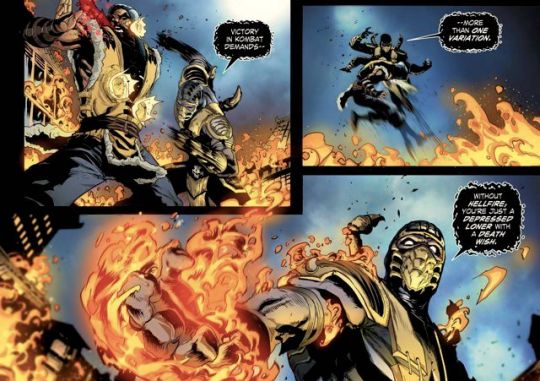
Scorpion: Without hellfire, you’re just a depressed loner with a death wish. Why deny the inferno within? Hanzo: I turned - memories of my family into weapons.
Hardly, Scorpioni is the clinging to the last vestiges of a lost cause, as executing Hammurabi’s Code - an eye for an eye - is not enough for his clan. All Scorpion wishes to do is to burn the whole world, along with all the loved ones of the present, specifically Takeda Takahashi. It’s much easier and effortless to be consumed in abysmal darkness; pitiless and deep, as the stirred hornet’s nest of his mind would continually battle with the bitter taste of defeat and deprsssion, torment, trials and tribulations of his life, as the more Hanzo rages, he will simply be rendered into the shadow beneath the street lantern in the night of Scorpion’s mind, so he refuses to give into the unnecessary wrath and vengeance Scorpion continues to urge Hanzo to enact forth.
By now, the Agents of Chaos - all the corrupted warriors of the Blood Code - and Havik would have been fighting Takeda, with Fujin’s gift bestowed upon Hanzo’s Shirai Ryu philosophy - a traditional mask of the Shirai Ryu, along with the serrated whip - as he would fight not for vengeance, but for justice. As Scorpion plunges a katana in Hanzo’s chest, the Demon demands that they do something to change the world, and this is where I have a huge beef with Hanzo’s characterization.
Scorpion: I don’t need a heart that bleeds with survivor’s guilt anymore. Now we feel changes nothing, but ourselves. Hanzo: I’ve worn guilt like a noose around my neck long enough. Time to let my actions speak for themselves. No guilt, no vengeance, only justice.
Searching for Hanzo Hasashi’s proverbial nature means that he would continue to live in between the flowers that are alive and the flowers that are alive; empty glasses of his mind and soul will remain unfilled, and a mountain of hope stacked like an immeasurable mountaintops will become withered like an illusion. The devils will grow like forests and make the clumped hellfire of his sin, the most deepest regrets to drown in the lake of infernal everburning flames, as he would cut down Scorpion with his ‘Stop Ahead’ fatality.
While Hanzo would own what he has done, as he would fully accept your accountability for his actions and all of their consequences in order to begin the process of forgiving himself, he would self-reflect on the events that have happened, as he would even re-experience them over and over again through his nightmares. However, knowing that given the frame of reference, Hanzo was doing what was necessary at the time. All he could do is to find more constructive ways to fill the same needs for not only his present that involves saving Takeda and preventing Havik from collecting Shinnok’s Amulet, but to build his future, which means he would reerect the Shirai Ryu for the third time.
He may learn from his mistakes, and mindfully consider the event and its repercussions, to reflect and think upon what he did, what he learned, as all those lessons in his life would improve his life and change him as a person to make amends and atone, but he would never, ever live with no guilt and no vengeance. Hanzo Hasashi’s PTSD, watching his despined skull gaze frozen Harumi and Satoshi with his own hollow, dead eyes, and seeing all the sanguine spectacle of the slaughtered clan members and watching the village being engulfed in flames would never become something that he will get away with. He will find ways to make other people’s lives better, and he will suffer from traumas, nightmares, and even panic attacks because his suffering and agony is so great. His atonement will become reparative and productive, and as the Grandmaster of the Shirai Ryu, he will apply lessons learned to practice mindfulness, in order to not fall back into the mistakes of his past.
And most importantly, Hanzo Hasashi will eventually forgive himself in the long run; he will forgive himself for the mistakes he has made, and he would allow himself to move forward in living as his best possible self.
Just before Havik takes entertaining pleasure in Takeda’s prolonged painful, agonizing death, Hanzo unexpectedly and abruptly makes his entrance to surprise the Cleric of Chaos, before ripping Havik’s head apart from his body, to disappear to the Netherrealm, leaving Takeda to plea for his Grandmaster, as Havik’s body, along with blood-trailed rivulets are left. Back in the Netherrealm, Hanzo shows up to meet Moloch and Drahmin hovering for carrion at the Gates of Hell, and tosses Havik’s head towards them.
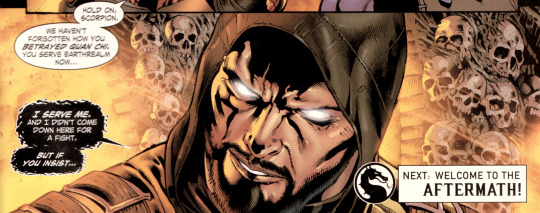
Moloch: Hold on, Scorpion. We haven’t forgotten how you betrayed Quan Chi. You serve Earthrealm now... Hanzo: I serve me, and I didn’t come down here for a fight. But if you insist...
While he continues to solidify himself as a true neutral; as people like Hanzo as of current are concerned primarily with their own well-being and that of the group or organization which aids them. They may behave in a good manner to those that they consider friends and allies, but will only act maliciously against those who have tried to injure them in some way. For the rest, he does not care. He does not wish ill on those he doesn’t know, but they also do not care when they hear of evil befalling them. Better for others to suffer the evil than the true neutral and his allies. If an ally is in need, he will aid him, out of genuine love or because he may be able to count on that ally a little more in the future. A "hell-fire and brimstone" lawful good priest is just as offensive as a neutral evil racial supremacist in his eyes, although this fact may be only exacerbated with the MKX story mode, where such exemplification is shown when Hanzo infiltrates the Special Forces Base with his ninjas, wanting to serve vindictive justice upon Quan Chi, now a withered sorcerer.
A true neutral like him may take up the cause of his nation, not because he necessarily feels obligated to do so, but because it just makes sense to support the group that protects his way of life. Hanzo being a true natural with a highly philosophical outlook, he may hold that law, chaos, good, and evil are all necessary forces in the universe. But all are of equal import, and none should be allowed to take precedence over another, unless an imbalance should be perceived - in which case corrective steps must be taken until the balance is righted once again. Hence, the motives of a highly philosophical true neutral character are perhaps the most difficult for any other alignment to fathom, for such a true neutral being will usually act first to preserve the balance, second if he deems it his business, and third if it is in his own best interests.
The Netherrealm’s existence is an absolute must when it comes to Hanzo Hasashi’s existence; for the blueprint of his being is now bound to its power, because he truly is the quintessential manifestation of such duality, the opposite, as the nature of fire dwells within him. The curse of destructive, annihilative hellfire, along with the magnanimous helios that dwell and bask towards those that need his protection, as this attitude of balance will ordinarily be reflected in Hanzo’s choice of companions and should thus be demonstrated with reasonable consistency. And this, I believe, would mark the beginnings of Hanzo’s journey of further character development, making him a strong individualist marked by a streak of kindness and benevolence, believing in all the virtues of goodness and right.
#✗ obsessive cathartic (headcanon)#✗ the ineffable testimony of spawned hellfire (scorpion)#✗ seeking reconciliation with his own humanity (iii)
1 note
·
View note
Text
Subject One Reports
Subject One was asleep in his cage after Lights Out when he was disturbed by a strange monster. It isn’t Doctor or Brother. He isn’t sure what it is, but it’s asking questions he doesn’t know how to answer. Is Outside really so different?
A semi-realistic take on Handplates by Zarla.
Click here to read on Archive of Our Own, or read more below the cut.
This was very heavily inspired by Zarla’s “Handplates” comics. As I was reading Handplates, I found it interesting that the skeleton brothers are so very well-adjusted. Humans, at least, learn from those around us: without outside influences, people in a Handplates-style situation would take much more after their captor than the skelebros do. There’s an interesting comic of Gaster teaching slang to Sans, but this was written before that was posted.
The brothers know there true names here, but that’s more because I wanted to make it easier to keep the boys separated.
I am well aware that there are tons of differences between this and Handplates proper. It isn’t intended to be in any way canon to that universe, merely an alternative and a tribute.
“H-hello?”
Sans lifted his head off his brother’s shoulder. That...didn’t sound like Doctor. He carefully extracted himself from his brother’s hold and crept closer to the bars that lined the entrance of his cage.
There was a light at the end of the hallway, moving back and forth in a rhythmic scanning pattern. It was strange; there wasn’t any light source in that location that Sans could remember.
“Hello?” the voice called again. It sounded high, hesitant, like Papyrus’s when he asked awkward moral questions.
The light began moving, swaying back and forth as it came closer. Sans watched the floating light curiously. It wasn’t demanding anything, wasn’t causing him any pain, but something told him to hide. He shrugged off the impulse. Where would he hide? Even if there was someplace to hide in the cage (and experience told him there wasn’t), how would he hide a sleeping Papyrus as well?
The light stopped right in front of the bars to his cage. “O-oh! Hello!” the voice said.
Sans just stared. He wasn’t sure what that word meant. He’d heard Doctor say it sometimes when he spoke into the communication box, but he didn’t see any communication box near the light. He couldn’t see anything besides the light at all, actually. It was just a floating rectangle of bright white facing the cage.
“O-oh! S-sorry.” The rectangle was flipped down towards the ground. In the ambient light, Sans made out the shape of a new monster standing behind the rectangle. It was a little taller than he was, though shorter than Doctor. It wasn’t skeleton-shaped, but thicker, like monsters in some of the picture books he had let them see when they were smaller. The monster was Justice-colored and wearing a bone-colored coat, like Doctor usually wore.
“A-are you okay?” the voice asked.
Finally, a question he could answer. “My status is satisfactory,” he said.
“U-um, what?”
Sans repeated himself, his browbone wrinkling in confusion.
“O-okay, that’s, um, a strange way to put it.”
“Why?”
“M-most people s-say something like, ‘I’m fine’ or ‘I’m hurt’ or something like that.”
“That seems inefficient.”
The strange monster blinked. “Um, I...I guess? Maybe? So...who are you?”
“I am Sans the skeleton.”
“N-nice to meet you, S-Sans! I’m A-Alphys.”
Sans wasn’t entirely sure what to do with this information.
“A-are you sure you’re okay?”
“I am not sure where your confusion lies?”
“You really d-don’t act like a-anyone else I’ve e-ever met.”
“That seems logical. Doctor always says I am deficient.”
The Alphys made a face that looked disappointed to Sans. He felt his soul sink. The first monster from Outside he’d ever met, and he’d disappointed it. He cleared his nonexistent throat. “My brother is a great improvement over me, if you would prefer to speak with him instead?”
“O-oh, there’s another one?”
“Yes. We are subjects one and two. I am subject one, my brother is subject two. Doctor made us as tools to assess the strength of the barrier, and ideally to break it in the near future.”
The monster’s eyes widened. “Y-you’re gonna b-break the barrier? Really?”
“If trials follow Doctor’s hypotheses, then yes.”
The Alphys looked down the hallway, nervous. It shifted the rectangle of light so the hallway it came from was illuminated, but there was no movement. After a moment, the Alphys’s attention returned to Sans. “Who is, um, ‘d-doctor?’ Which doctor do you m-mean?”
He cocked his head to the side. “I apologize for my deficiency, but I do not understand your question. Doctor is…” words failed Sans. He tried to recall descriptive words, but it had been so long since he’d seen the books on colors and shapes that his memory was a little fuzzy. He didn’t need to remember which color was ‘yellow’ or ‘red’ when there was much more important information Doctor gave him. “Doctor is...long? Up?” He stretched his hands towards the ceiling, trying to convey meaning through gesture.
“Y-you mean, tall? He’s tall?”
‘Tall’ sounded right to Sans. “Likely. He is also, um, brittle? Not sturdy?” He brought his hands together, palms facing each other.
“Thin, you mean?”
“Perhaps?”
“Skinny, maybe? Is that the word you’re looking for? Not fat?”
“I...am unfamiliar with those words.”
“O-oh. Sorry. Um...do you know wh-what kind of m-monster he is?”
“Naturally, he is a skeleton monster. A real monster, not like Papyrus and I. Oh, are you well?”
The Alphys had taken a step away from the bars and had a hand over its mouth. Sans wasn’t sure what that was meant to accomplish, but when it started shaking its head a moment later he assumed the gesture denoted distress. “Y-you mean Dr. G-Gaster. Dr. Gaster m-made you.”
“I am unfamiliar with those words?”
“O-oh my, it m-makes so much sense. Y-you even talk l-like him.”
He frowned. Of course he spoke like Doctor; Doctor was the only real monster he’d ever come into contact with.
“A-and what d-do you mean, that you and P-Papyrus aren’t m-monsters? Aren’t you a-alive?”
“We are alive. We are tools, not monsters.” Sans wasn’t sure why that comment caused tears to trickle down the sides of the monster’s face. “Are you in pain? I am unsure why you are crying.”
“O-oh, sorry, no. I-I’m f-”
The lab lights came on in a single blinding wave, not the gradual process Sans was used to. The Alphys hissed and covered its eyes. Perhaps it was afraid of light? Or did it know what the lights meant?
The tap-tap-tap of Doctor’s shoes came down the hallway moments later, much faster and heavier than Sans was used to. There was a scrabble as the Alphys attempted to find some hiding place in the hallway, but Sans knew from previous escape attempts that it was no use. One end of the hallway led to the main labs: the experiment rooms, isolation chambers, recovery rooms, and the door Doctor used to access Outside. The other end terminated at a storage room.
There was no way out.
“What do we have here?” a familiar voice asked.
Sans wasn’t sure whether Doctor was referring to Sans or the Alphys, so he remained silent. He did stand at attention next to the bars, though, in case he was needed.
“Subject One, report.”
“The Alphys came down the hallway with a light,” Sans said. “It inquired about my health, and I provided a status update. It then requested an analysis of you. I provided one as best as I could with my deficiency of language.”
“And what was your analysis, Subject One?”
“We concluded that you are tall and thin. Or skinny.”
Doctor made that strange noise he made when he was pleased, so Sans relaxed a little. He was unsure what had pleased Doctor, but sometimes the monster showed emotions he didn’t understand. It was part of being a real monster, he’d been told over and over again.
Doctor looked back down the hallway. “Little Alphys. An intern in our mechanical department. Aberner’s daughter, correct?”
“U-um, y-yes?” Sans heard the Alphys’s voice echo a little, but couldn’t see it.
“Whatever are you doing all the way down here?”
“I-I was curious-”
“I am certain your father has warned you about such things around my lab.”
“W-well, yes, b-but-”
“And you elected to disregard him. I see. Subject One, wake Subject Two. I have a valuable lesson for you both.”
Sans scrambled over to his brother. Papyrus was half-awake already, his sleep disturbed by the light and sound, so getting him upright and presentable was an easy task. Both held out their hands without a fight when Doctor opened the door. The control cuffs were relatively new, implemented after Sans had tried to escape one time too many while Doctor’s back was turned, and he already hated them with a passion.
“Follow me,” Doctor said.
Sans did as he was ordered, but kept glancing at the strange monster. Doctor had the Alphys caught in blue magic. Escape was impossible.
He felt...disappointment? Regret? It was the same way he felt when he failed one of Doctor’s logic tests, like he should have been able to do something but his deficiencies were too great. Had he failed some test from the Alphys? He thought back over their conversation. Perhaps he should have been better at using his descriptive words?
Doctor led them to the examination room and closed the doors. “Stand against the wall and watch,” he ordered. He held the Alphys down with some difficulty, despite the blue magic, but eventually wrenched both its arms and its legs to the table. Sans hadn’t noticed before, but the Alphys had a tail; this Doctor had to tape down, as the examination table didn’t have a restraint for such an appendage. Another length of tape went over its mouth to silence its cries.
Finally, the Alphys was restrained and quiet. “Watch carefully,” Doctor said. “This is what happens when you fail to obey.”
Both watched. Sans could feel Papyrus shifting in confusion, but didn’t dare say anything. He’d explain what happened with the Alphys once they were returned to their cage.
The procedure Doctor used on the Alphys was not very scientifically sound. There were far too many unmitigated risks, from what Sans could see. Perhaps Sans’s deficiencies were preventing him from understanding the procedure, but it looked to him like Doctor merely intended to harm the Alphys instead of using it to better understand anything.
The Alphys began wailing pitifully halfway through the procedure, and Sans’s soul beat in sympathy. Papyrus shuffled closer, apparently affected by the sound as well, and Sans carefully adjusted his hands in his control cuffs so that the back of his hand brushed against the back of his brother’s. It was the most he dared.
“One point of health left,” Doctor said, finally. “You have been a very bad little girl, Alphys. The question now stands: should I let you go, or should I take care of you like the rat you are?”
The Alphys made muffled, distressed sounds. Sans could only guess that it wanted to be released. That’s what he would want, anyways.
“Oh? You wish to contribute your body to science? A noble endeavor, my dear, but I am afraid I have nothing to learn from you. You see, I performed as many experiments as I dared on monsters before creating my tools. It is...frowned upon Outside to experiment on the living, you see. The ignorant fools fail to understand my higher purpose.” Doctor walked slowly around the table. “In short, Alphys, you are useless. Well? Anything to say?”
The Alphys was crying again.
“Very well.” A single bone appeared in Doctor’s hand, which he used to give the Alphys a single firm tap on the head. Immediately it stiffened, sobbed once, then dissolved into a cloud of grey-white dust.
Doctor retrieved his communication box and pushed some buttons. After a moment, he spoke. “Hello. Yes. Doctor Aberner, correct? I regret to inform you that your daughter, Alphys, snuck into my private lab while I was away. I found her playing with some very dangerous tools. ...No. I made my way back to the lab as soon as I was alerted of a foreign presence, but I fear my appearance must have startled her. I could retrieve nothing but dust...and her clothing, of course, if you wish it.
“Oh, naturally, I will return it to you. My condolences to your family. I only wish she had not gotten involved in such things. Do you know how she could have come to be down here? No, I understand. The investigation can wait, of course, until you have a chance to mourn. I am certain the security team has tapes; there is no need to trouble you or your family unless some kind of foul play shows up.
“Very well. No, I fear I am still in shock myself; I have not had the opportunity to collect it. No, you may not come down here. I am blocking off this lab until further notice; I would hate to have a repeat of this...tragedy. Yes, you may meet me in the first floor lobby. It may take me some time to collect myself, but I shall meet you there as soon as possible.”
He pushed another button on the communication box, then looked over the brothers. “A real monster lost her life today because she was not obedient to the orders she was given. Do not think for one moment that either of you are any better than she was. Do you understand?”
“Yes,” they said in unison.
“Subject One, since you gave me a clear analysis of the situation, I will grant you a reward. What is your request?”
Sans could feel his brother’s eyes on his face, making it hard to think. He wasn’t used to this...choice. It was confusing. What was the right answer? What was the wrong one? What would happen if he failed this test?
“I request information on shapes and colors,” he said, finally, “So that I may be less deficient in those areas.”
Doctor’s eyes widened, and Sans sensed that he’d taken the monster by surprise. It was a heady feeling, like he’d gained some kind of hold. It only lasted a moment. “I...well. Very well. I shall compile the information for you and will provide it to you in the near future. I shall be busy over the next few days, however. Both of you, come with me; I must give you food rations to last until I am next able to come down here.”
Both brothers were laden down: Papyrus with water bottles, Sans with food ration bars. It was hard to hold onto so many of them with the control cuffs on, but they didn’t dare drop anything.
“You must ration them carefully. If you eat and drink all your supplies in one day, you may die before I am able to return. Do you understand?”
“Yes,” they replied.
“Very well. Back to your cage, now. I shall clean up this...mess.”
The brothers followed. Doctor grabbed a few books - treats he usually reserved for the recovery room - from his desk as they passed, and placed them on the single table in the brothers’ cage, along with the magic-fuelled lantern he gave them when he disappeared for long periods of time.
“Do not destroy these,” he said. “I shall return as soon as I am able. Until then...well. Do try not to kill each other.”
He left, footsteps tap-tap-tap-ing back down the hallway, and the lab went dark.
Sans sat, still and quiet, for a long moment. He felt very conflicted about what had just happened. It had been interesting to talk with a monster from Outside, and he regretted not using the opportunity to ask more questions. On the other hand...the Alphys had apparently been disobeying someone. Doctor said that the Alphys had been warned not to come down to the lab, which made sense; being in the lab usually meant being hurt. Doctor was the only one who could move through the lab without pain, but that was because he was the one performing experiments.
The Alphys...didn’t perform experiments at all. It had asked strange questions, using words Sans didn’t know or could barely remember. Did all monsters in Outside talk like that? It was hard to imagine such a place.
“BROTHER,” Papyrus said, finally. “I AM HUNGRY.”
Sans made his way over to the table on memory, then felt around for the lamp. A brief flare of magic ignited the lamp and allowed them to see their supplies.
“I think we should only eat our usual rations,” Sans said. “We do not want to run out of food before Doctor comes back.”
“THAT IS UNACCEPTABLE! I AM HUNGRY NOW!”
He looked over their rations, counting the food bars. “We can each eat one now,” he concluded. “We will eat one ration bar for the lights-on meal and the lights-off meal. Two ration bars for each of us every day will last us...four days. If Doctor does not return within three days, we will go down to one ration bar each day. Is that acceptable?”
“WELL…”
“If you have a better ration plan, please present it.”
“NO, THAT IS ACCEPTABLE.”
Sans smiled and passed a ration bar to his brother. They ate in silence, thinking.
“BROTHER, WHAT WAS THAT CREATURE? WAS IT A MONSTER, OR ANOTHER TOOL?”
“It was a monster from Outside. It called itself the Alphys.”
“THE ALPHYS? I HAVE NEVER HEARD OF SUCH A THING. WAS IT LIKE THE FLUFFY BUNNY?”
“I...am unsure? It did not look like the Fluffy Bunny.”
“YOU ARE CORRECT.” There was a pause as Papyrus disposed of their food ration wrappers. “WHY DID YOU REQUEST INFORMATION ON SHAPES AND COLORS?”
“The Alphys spoke of those things like they were ordinary. It appeared distressed that I was unable to find the right descriptive words. I wish to correct that deficiency.”
“IN CASE WE CAN GO TO OUTSIDE SOMEDAY?”
Sans looked around. He was pretty sure Doctor wasn’t listening, but he couldn’t be too careful. “...Yes. It is bad enough that I am the deficient tool; I do not want to be deficient in language.”
Papyrus hummed. “WILL YOU LET ME SEE THE INFORMATION AS WELL?”
“Of course! You will probably remember it better than I will.”
“THIS IS TRUE. NOW, CAN WE GO TO BED?”
“Yes. Have good dreams, Papyrus.”
“HAVE GOOD DREAMS, SANS.”
The light went out.
#Dragonashes writes#Undertale#Oneshot#Sans#Papyrus#Gaster#Alphys#Major character death#Bad science#Not even proper Handplates#Bad Gaster
2 notes
·
View notes
Note
Do you think Matt is better suited as a prosecutor, or a defence attorney, as he seems to have been most of the time? Which, in your opinion, does he seem to prefer?
This actually doesn’t come up as much as you might think, so it’s hard to point to a specific panel and say “Hah! Yes, Matt prefers ____”. There’s also not a ton of consistency, and he will occasionally jump from defense to prosecution from one case to another without explanation. But his general trend is toward defense, and since that’s the type of law he’s practiced for most of his career, we can assume that’s what he’s most comfortable with. He hasn’t shown a particular talent for one over the other either. He’s a good lawyer no matter which side he’s on, but overall, he’d rather spend his professional life keeping innocents from going to jail than throwing bad guys in jail– which is part of the reason why he does the Daredevil thing in his off-hours. That way, he is able to balance out the occasional instance of defending people he knows are guilty. And that leads right into your other question, so we hope you don’t mind if we go ahead and answer that here too…

All the time. There’s a reason he’s been disbarred so many times. (Actually, there are two reasons, but we’ll leave the Kingpin out of this for now. The problem is mostly Matt.)

Judge: “Our issue is less with your sabotage of the Ogilvy case than with Nelson & Murdock’s now-disclosed history of ethics violations. Your past activities as a vigilante, as well as the questionable actions you and your partner have taken to preserve that identity, leave us no flexibility. With a heavy heart, this court hereby disbars Matthew M. Murdock and Franklin P. Nelson.”
Daredevil vol. 3 #36 by Mark Waid, Chris Samnee, and Javier Rodriguez
Matt is a moral guy but a very unethical lawyer, simply because he does operate on both sides of the law. Every single case he takes on is tainted in this way, because he nearly always uses his Daredevil identity and powers to gather evidence and determine guilt. At this late point in the Marvel universe (and with the exception of the period when the Superhero Registration Act was being enforced), being a vigilante doesn’t seem to be quite as illegal as it is in our world, simply because there have been so many dang superheroes around for so long. However, Matt is put on trial for vigilante activity– which we’ll be talking about later in the post– and it’s still a clear breach of legal protocol, and not what a lawyer should be doing. There’s also the factor of his powers, which he uses on a regular basis to give himself an edge, and on which he relies to an unwise degree. He hates defending guilty clients, and has gotten himself into trouble before by trying to determine guilt via heartbeat. All of this isn’t just a Matt problem, by the way– though it does tend to come up more with him than with other superhero lawyers. There’s a great issue of She-Hulk, for example, (She-Hulk (2004) #1, to be specific) where Jen loses a winning verdict because she saves the world while the trial is going on, and the judge rules that this biased the jury in her favor.
But Matt is the Unethical Lawyer poster child when it comes to this sort of thing, and this conflict has been a major theme in Daredevil comics, particularly within the last decade-or-so. With this in mind, we’re going to be providing just a few examples, rather than a comprehensive list of offenses.
The “Worlds Collide” story from volume 4 #15.1 focuses specifically on this dichotomy of legal work versus superhero work. Early in both his legal and… extralegal careers, Matt is assigned to defend a man who he apprehended as Daredevil. While spending his nights trying to ascertain whether his client is actually guilty, in court he is put in the position of arguing against the concept of superheroes.
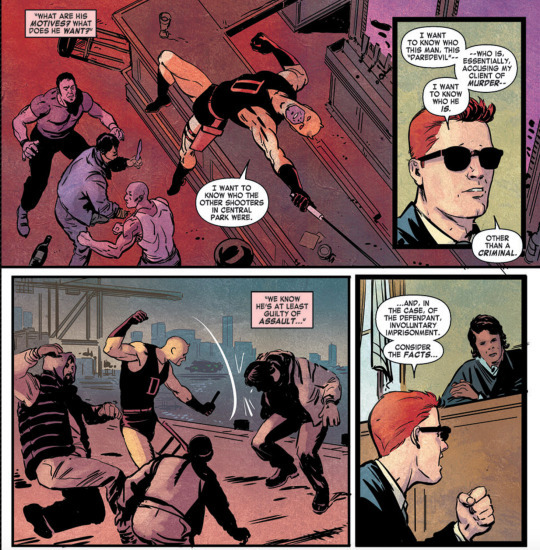
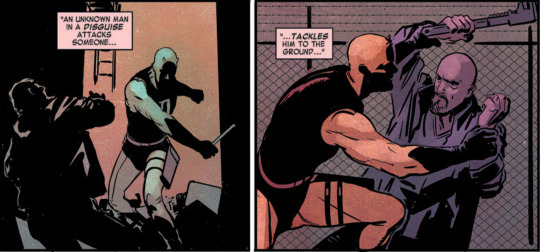

Matt: “What are his motives? What does he want? I want to know who this man, this ‘Daredevil’– who is, essentially, accusing my client of murder– I want to know who he is. Other than a criminal. We know he’s at least guilty of assault… and, in the case of the defendant, involuntary imprisonment. Consider the facts… An unknown man in a disguise attacks someone… tackles him to the ground… and yet it’s the person who was assaulted who gets arrested? This isn’t justice. And it’s not how the justice system is supposed to work.”
Daredevil vol. 4 #15.1, “Worlds Collide” by Marc Guggenheim, Peter Krause, and Matt Wilson
Matt is fully aware of the irony of making this argument and yet continuing to try and determine his client’s guilt as Daredevil. He knows what he’s doing is wrong, and he cares deeply about his career as a lawyer. That’s an important point that we want to make clear. It’s not just a cover/source of intel for his secret life, as jobs occasionally are for superheroes– he genuinely loves being a lawyer and cares about the legal system. But even in this story, at this early point in his career, he feels justified in taking massive liberties with the law for the sake of ensuring that justice is actually done. He’s a self-assured enough person to believe that he knows best, and that his interventions as Daredevil are fair and necessary. That doesn’t mean they are– but that’s his mindset, and it always has been.
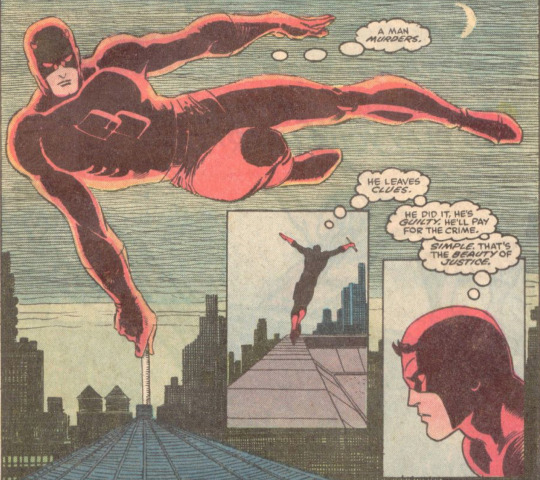

Matt: “A man murders. He leaves clues. He did it. He’s guilty. He’ll pay for the crime. Simple. That’s the beauty of justice. Daredevil tracks him, Matt Murdock makes him pay. Simple, gorgeous justice. When I’m poor, blind Matt Murdock, it’s easy to believe in the law, in the courts. Why is it, soon as I put on this suit– I feel that belief cracking? Doesn’t matter. Tonight will be different. I’ll reel the killer in, and the courts’ll get him locked up for life. Pure, beautiful justice.”
Daredevil vol. 1 #251 by Ann Nocenti, John Romita, Jr., and Christie Scheele
(By the way, this is a good example of what we were referring to in response to your first question. Matt is thinking like a prosecutor here.)
To explain his willingness to cross these lines– if not to necessarily justify it– we need to look back at his origin story. A key part of his decision to become Daredevil in the first places was the fact that his father’s killers didn’t go to jail for their crime– and I’m partial to renditions of his origin that make clear that he only goes after the Fixer and friends himself after they’ve been put on trial.

Matt: “We did it all by the book. The police weren’t surprised that Sweeney and Slade were involved and it wasn’t long before they were arrested. But, on the day of the bail hearing, suddenly, they had some Park Avenue attorney. His hair gel cost more than what Foggy and I were wearing.”
Daredevil: Yellow #1 by Jeph Loeb and Tim Sale
He sees justice fail, and so steps in to pick up the slack. Whether this was a good move on his part is up for debate. He unintentionally causes the Fixer to die of a heart attack long before he has a chance to go to jail, for instance, which is a moral issue all on its own. But with this inciting, highly personal incident always in the back of his mind, and as his legal career continues to show him the gaps and weaknesses in the system, he feels continually justified in filling in the cracks with his own brand of crimefighting.
But credit where credit is due– right now, at this very moment in the current run (spoiler alert!), Matt is taking steps to address this issue. He and the D.A.’s office are attempting to set precedent for allowing superheroes to legally contribute their skills and testimony to criminal investigations, without being forced to reveal their identities.

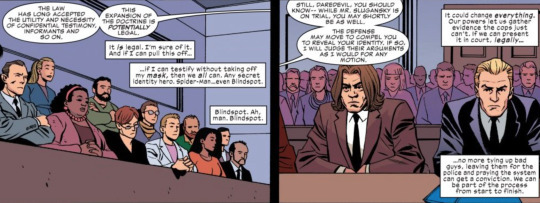
Matt: “Slug’s gang escaped, but we got him, and I picked up plenty of evidence with my super-senses. If the judge lets me testify, I can put him away, and maybe get him to turn over on his crew. It is legal. I’m sure of it. And if I can pull this off… if I can testify without taking off my mask, then we all can. Any secret identity hero. Spider-Man… even Blindspot. […] It could change everything. Our powers let us gather evidence the cops just can’t. If we can present it in court, legally… no more tying up bad guys, leaving them for the police and praying the system can get a conviction. We can be part of the process from start to finish.”
Daredevil vol. 5 #22 by Charles Soule, Goran Sudzuka, and Matt Milla
This still doesn’t seem to address the fact that Matt is both a superhero and a lawyer, and is still free and willing to interfere in questionable ways in his own cases with no oversight– but hey, it’s still a big deal.
Generally, the instances of Matt behaving unethically that are emphasized within the narrative specially for being unethical, involve Matt trying to protect his life as Daredevil. His identity has been leaked to the press twice. The first time, fortunately, the journalist was discredited before the story got too far or Matt had to make any big moves. But the second time, when his secret identity is printed on the front page of the Daily Globe (not to be confused with the Daily Bugle) during Bendis’s run, he is forced to choose between accepting the charges or lying, both in public and in court. He opts for lying (with Foggy’s full-if-uncomfortable support), and the two of them even go so far as to sue the Globe for libel.
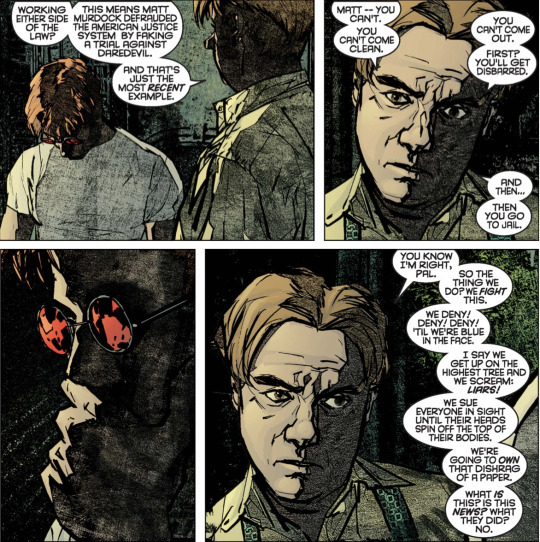
Foggy: “Working either side of the law? This means Matt Murdock defrauded the American justice system by faking a trial against Daredevil. And that’s just the most recent example. Matt– you can’t. You can’t come clean. You can’t come out. First? You’ll get disbarred. And then… then you go to jail. You know I’m right, pal. So the thing we do? We fight this. […] We get up on the highest tree and we scream: liars! We sue everyone in sight until their heads spin off their bodies.”
Daredevil vol. 2 #33 by Brian Michael Bendis, Alex Maleev, and Matt Hollingsworth
When he is put on trial for operating as a vigilante, Matt contemplates fighting his way out of the courtroom and just running away, before deciding to plead not guilty. He does, notably, feel bad about all this later, and reflects on it in volume 3 #36 when he finally decides to out himself as Daredevil. But that certainly hasn’t stopped him from lying and playing with the law since.
Arguably the most egregious– and certainly the most memorable– example of Matt’s shaky legal ethics (which Foggy references in the excerpt above) is the “Playing to the Camera” arc (DD vol. 2 #20-25). This plotline centers around Matt and Foggy getting hired to sue Daredevil, allegedly for causing some major property damage. Matt knows he didn’t do it, and is affronted that his honor is being impinged by some troublemaker pretending to be Daredevil. Despite the obvious immorality such a thing would involve, and Foggy’s protestations, Matt takes the case to keep control of it and prevent other lawyers from snooping around in Daredevil’s business.
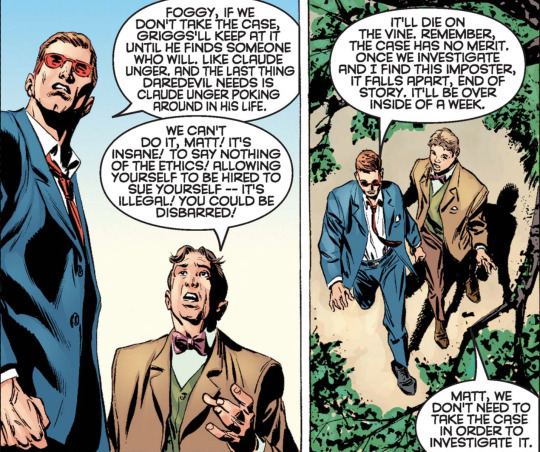
Matt: “Foggy, if we don’t take the case, Griggs’ll keep at it until he finds someone who will. Like Claude Unger. And the last thing Daredevil needs is Claude Unger poking around in his life.”
Foggy: “We can’t do it, Matt! It’s insane! To say nothing of the ethics! Allowing yourself to be hired to sue yourself– it’s illegal! You could be disbarred!”
Matt: “It’ll die on the vine. Remember, the case has no merit. Once we investigate and I find this imposter, it falls apart, end of story. It’ll be over inside of a week.”
Daredevil vol. 2 #20 by Bob Gale, Phil Winslade, James Hodgkins, et al.
Surprise– it’s not over inside of a week, and it does go to court, and Matt finds himself in the position of having to sue himself. He manages to be in two places at once by convincing Peter Parker to pretend to be Daredevil, going behind his (DD’s) lawyer’s back in the process. It’s a hilarious, utterly unethical mess– and one Matt is perfectly willing to undertake for the sake of protecting his identity.
In short: lawbreaking is inherent in the superhero genre, and Matt’s position as a lawyer and devotion to the proper functioning of the justice system in no way prevents him from bending legal ethics to their absolute limit.
42 notes
·
View notes